- India
- International
Behind Alappuzha’s transformation into one of India’s cleanest cities
Last year, Alappuzha was bestowed the award of ‘cleanest city in the country’ by the Centre for Science and Environment (CSE).
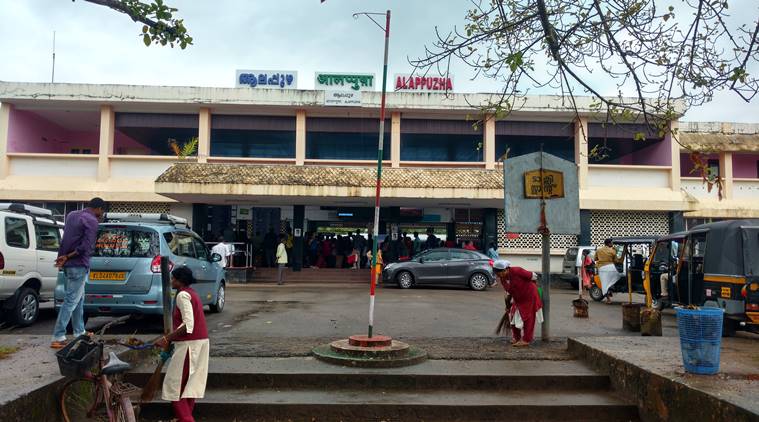 Civic officials spoke of a time pre-2012 when it was almost difficult to walk on public roads in the town without covering one’s face. (Source: Express photo by Vishnu Varma)
Civic officials spoke of a time pre-2012 when it was almost difficult to walk on public roads in the town without covering one’s face. (Source: Express photo by Vishnu Varma)
Until about five years ago, the roads in this coastal tourist town were teeming with heaps of filth and plastic waste at every intersection. Civic officials spoke of a time pre-2012 when it was almost difficult to walk on public roads in the town without covering one’s face, thanks to the putrid smell emanating from the garbage. Almost on cue, that was the time when an enraged public began agitating against the mountains of garbage piling up at a landfill site in Sarvodayapuram in 2012 thus sending civic officials into a tizzy trying to figure out a solution to the solid waste problem. That’s when then-MLA and current finance minister Thomas Isaac and some civic officials got down to work, framing a blueprint for a decentralized programme through which households could treat biodegradable domestic waste in their own backyards.
Today, five years later, civic officials in Alappuzha are a happy lot. The campaign, known as ‘Nirmala Bhavanam, Nirmala Nagaram’ (Clean House, Clean City), has been a roaring success, with most households going green and substantially shifting the weight of waste management away from the shoulders of the municipality. Last year, Alappuzha was bestowed the award of ‘cleanest city in the country’ by the Centre for Science and Environment (CSE). A few days ago, a greater honour came calling with the United Nations lauding its efforts and naming the city among five global destinations to successfully and sustainably manage solid waste.
So how did they do it?
“The objective was to change the habits of people and encourage segregation at home. On a pilot basis, we selected 12 wards some of which were densely-populated. The idea was to set up organic compost units in 80 per cent of households,” said Jayakumar C, a health inspector at Alappuzha municipality who has worked actively in the campaign from the start.
A strong awareness campaign was swung into motion with councillors and sanitation workers going door-to-door to educate people on the benefits of segregating wet waste from dry waste and plastic. Sanitation clubs were formed in schools and children were encouraged to collect plastic in return for coupons that would get them books at select shops.
As a second step, families were offered two options of treating domestic wet waste: an aerobic pipe compost or a more-expensive portable biogas unit. Both options were offered at heavily-subsidised rates by the municipality. For example, an aerobic pipe compost unit, that sells in the market for Rs 1000, is offered to families at Rs 100 with the municipality and the state government sharing the subsidy of 90%. Similarly, a portable biogas unit, that costs Rs 15000, is given to families at a 75% subsidy — translating into an affordable cost of Rs 3750 for each household.

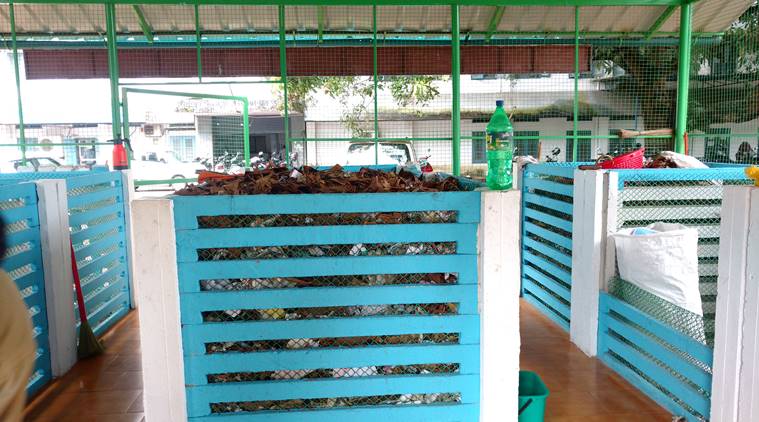 Civic authorities believe that the expansion of the aerobic compost units in all wards will ensure the city is litter-free. (Source: Express photo by Vishnu Varma)
Civic authorities believe that the expansion of the aerobic compost units in all wards will ensure the city is litter-free. (Source: Express photo by Vishnu Varma)
The objective of both is the same: converting domestic wet waste into usable bio-manure. The wet waste, consisting of food leftovers and vegetable peels, is fed into the compost unit/biogas unit along with some water and cow-dung in liquid form. Things like egg shells and bones of chicken or fish are not degradable and hence separated from the waste. Officials say the waste takes about three months to get converted into organic manure which can subsequently be used in gardening.
“When the pilot project began showing results, we expanded coverage to all the 52 wards. Till date, close to 3000 biogas units and nearly 2800 pipe compost units have been delivered throughout the town to families. They are treating the wet waste at source,” said Jayakumar, sitting in the municipality office.
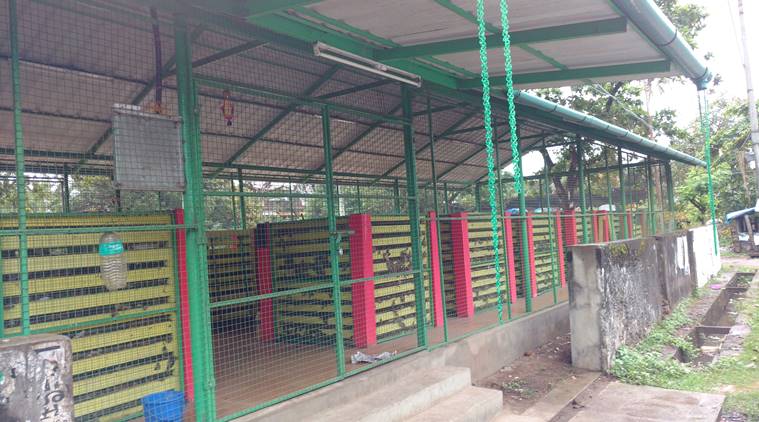 (Source: Express photo by Vishnu Varma)
(Source: Express photo by Vishnu Varma)
For households which don’t have adequate space to set up compost units or are unwilling to buy them, the civic body has set up community aerobic compost units in 23 wards. One such unit was located in Kidangaparambu. By the side of a road, within a grilled enclosure, concrete tank-like structures stood, some filled with waste, others empty. Between prescribed timings in the mornings and evenings, residents make a beeline for the compost unit, handing over their domestic food waste and non-biodegradable plastic waste separately to sanitation workers. The workers then make layers of food waste interspersed with dry leaves in the concrete structure. Liquid cow-dung is sprinkled to ensure bacterial action and to keep away flies and mosquitoes. Within a few months, the waste gets converted into usable bio-manure and distributed free-of-cost to people. The bio-manure is also used in organic farming.
“Segregation of waste is like brushing your teeth. It should be a habit,” said Swati Singh Sambyal, who spent months researching the Alappuzha model as part of the CSE’s ‘clean city’ awards.
Plastic waste, collected separately, is shredded into tiny pieces and mixed with tar for construction of roads.
“In the next few months, we will be allocating Rs 1.5 crore to set up community aerobic compost units in all 52 wards. We have also formed teams of Haritha Karma Sena (green volunteers) in all the wards. By March, we will move towards a ban on plastic and will encourage residents to use cloth bags,” said municipal chairperson Thomas Joseph proudly.
“Thomas Isaac was the brain behind it. He deserves the praise,” said Joseph, who took over as chairperson in 2015.
Making breakfast on biogas
Jayasree, a home-maker in Alappuzha, beams proudly as she shows the biogas stove in her kitchen. The stove is connected via a pipe to the portable biogas unit in which the household’s wet waste goes in. According to officials, eight kilograms of waste in a 1MQ biogas unit can produce about two hours of biogas, thereby serving as a healthier and cheaper alternative to the LPG.
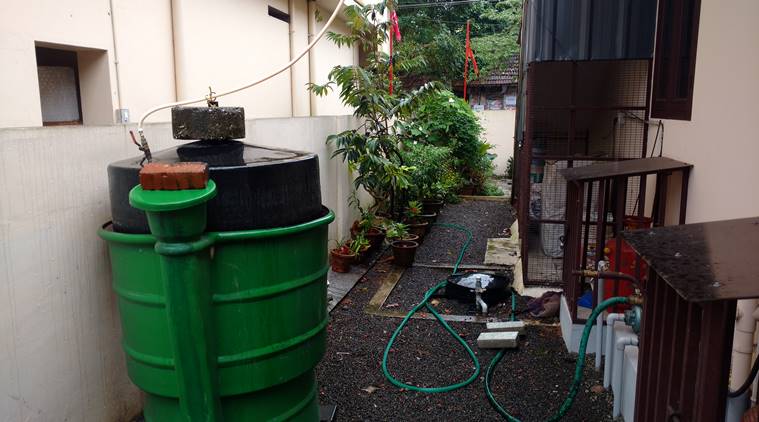 A portable biogas unit, that costs Rs 15000, is given to families at a 75% subsidy — translating into an affordable cost of Rs 3750 for each household. (Source: Express photo by Vishnu Varma)
A portable biogas unit, that costs Rs 15000, is given to families at a 75% subsidy — translating into an affordable cost of Rs 3750 for each household. (Source: Express photo by Vishnu Varma)
“We often boil rice and make tea. Sometimes, we even prepare breakfast like idly on the stove,” said Jayasree. “We are just two people living in this house. If there are more members in the house, there will be more domestic waste. The amount of biogas produced then will also be more. You can easily save money on your LPG bill,” she said.
Her husband, Unnikrishnan Pillai who retired as the deputy director in the state’s agriculture department, said more than saving on fuel, the important factor is that solid waste is being treated sustainably.
“This is a good model. Because of subsidy, the biogas unit is not very expensive as well,” he said. Apart from biogas, a slurry is also produced from the waste which can be used as manure.
Sustaining is critical
Despite the achievements of the municipality, stray incidents are still reported of people throwing plastic kits filled with garbage on the streets.
“If you see one plastic bag at an electric pole in the morning, by evening, there will be a heap,” said Pillai. “These are young boys on bikes throwing waste on the roads. They should be motivated to treat waste responsibly.”
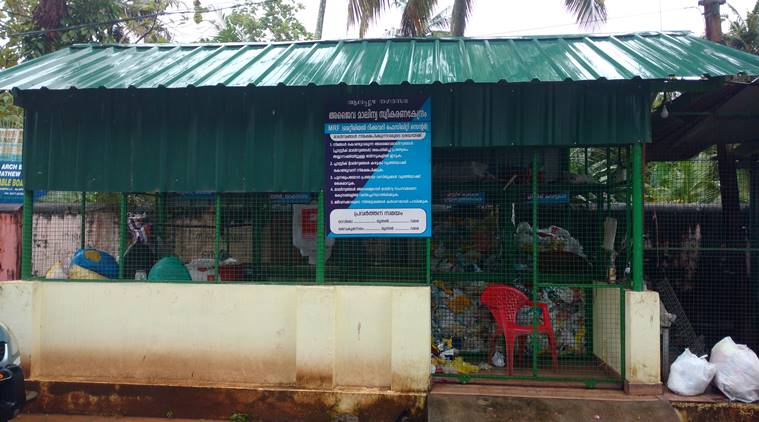 (Source: Express photo by Vishnu Varma)
(Source: Express photo by Vishnu Varma)
Municipal Chairperson Joseph also admits that about 20 per cent of the population have to be made aware of sustainable practices. CCTV cameras have been installed to check on waste disposal crimes and hefty fines are being implemented, he assured.
The sustenance of the model is therefore critical. But civic authorities believe that the expansion of the aerobic compost units in all wards will ensure the city is litter-free. Being a city that sees arrival of a large number of foreign tourists especially in the autumn and winter months, it is important for them to keep Alappuzha’s image intact.
“Today, sanitation workers in the town are confident about their work. Their morale has been boosted through this campaign,” said Akhil, a programme manager of the district cleanliness mission.
Apr 19: Latest News
- 01
- 02
- 03
- 04
- 05






































